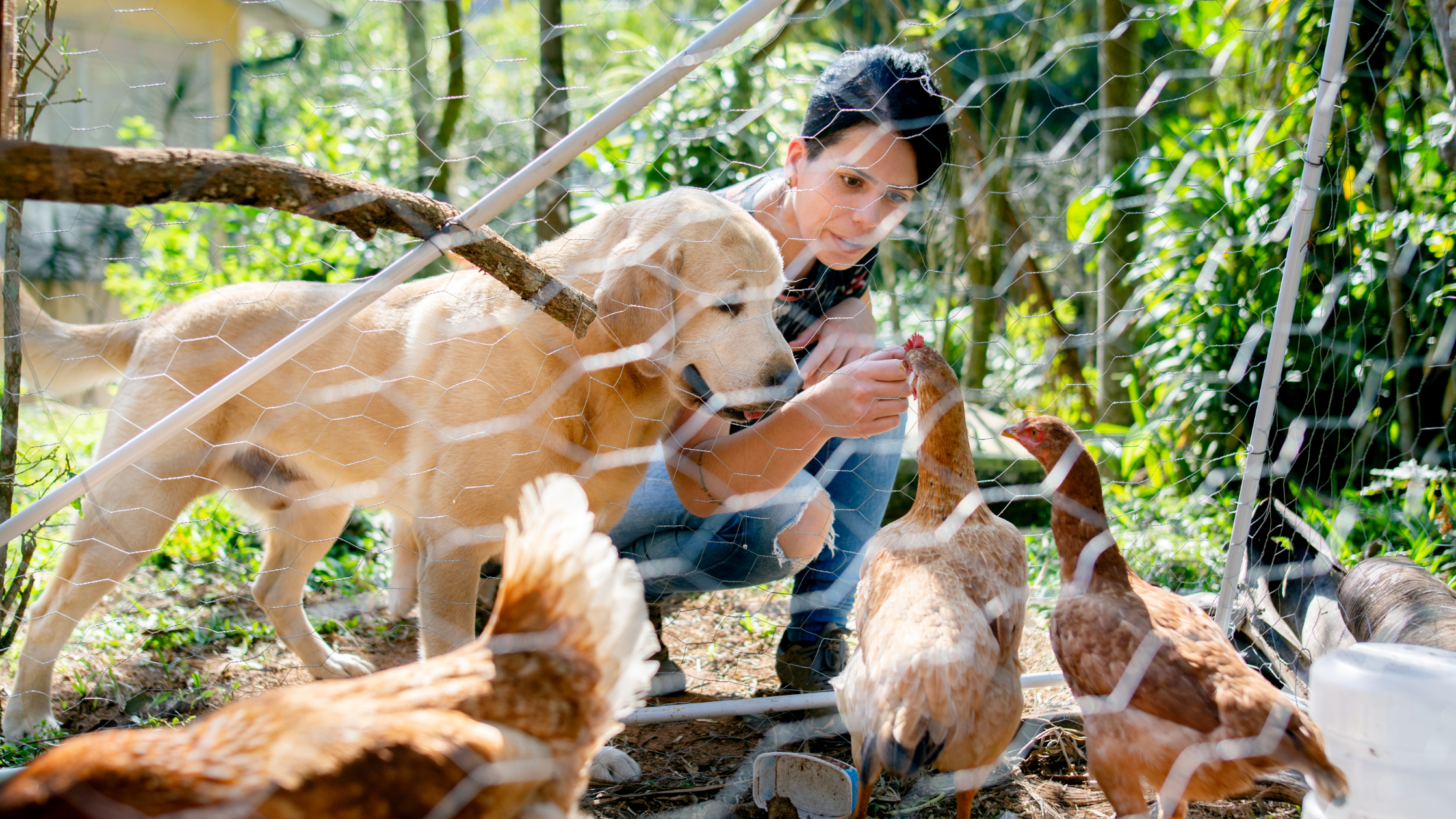Last Updated on 11/23/2021 by Veronica Jones
Dogs and chickens; natural enemies or good friends?
Lots of dog owners choose to keep chickens too. Not only are they great for producing free eggs, but they also provide a free-of-charge fertilizer and weeding service. What’s more, chickens make great companions.
With the right breed of dog, some training and tips, dogs can live harmoniously alongside chickens.
Our guide details the 10 best dogs for chickens, including the best dog breeds for herding chickens, the best dog breeds for protecting chickens and the best farm dogs for chickens. We also provide some handy advice on how to successfully keep dogs and chickens together.
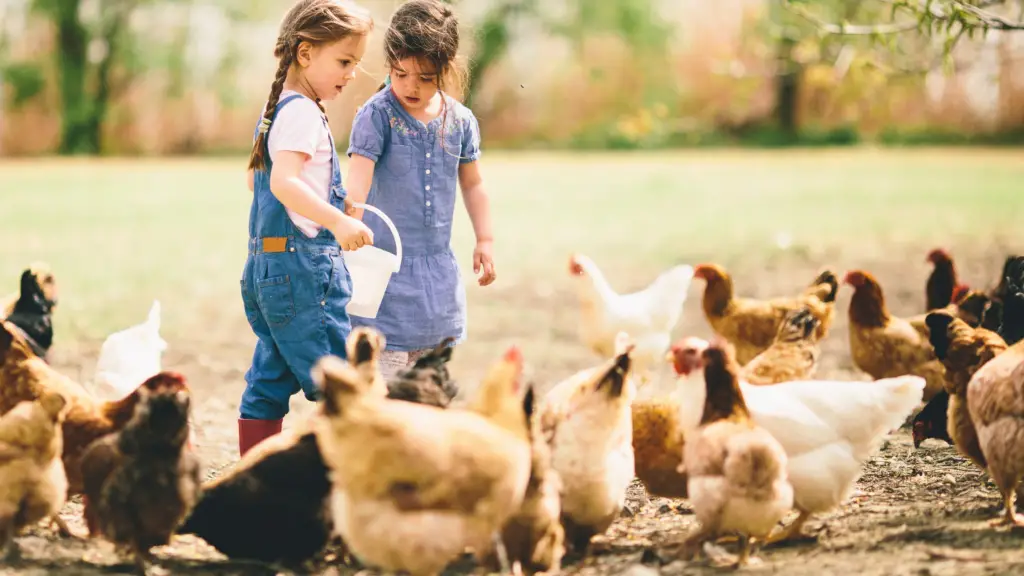
10 best dogs for chickens
These chicken-friendly breeds are the best dogs to keep with your flock. They have a low-prey drive and can be trained to protect livestock.
1. Kangal
If you are searching for a strong-willed, large dog with a low prey drive, a Kangal is a great option. They require little training and will defend their flock to death. Patrolling and guarding are natural traits for this breed, making them a popular choice of dog to keep alongside various types of livestock.
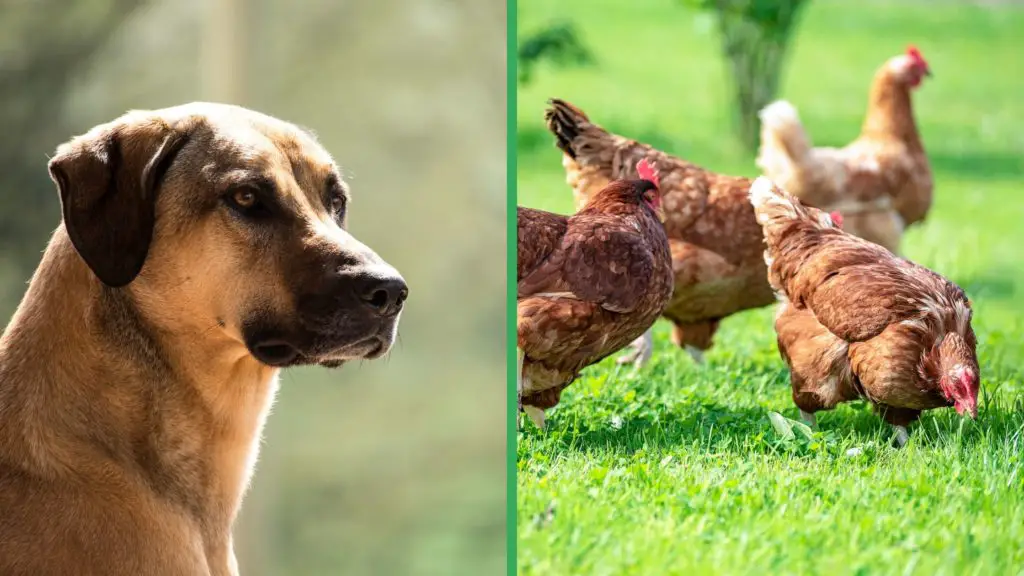
2. Old English Sheepdog
The Old English Sheepdog is a friendly and affectionate breed that can be raised with other animals such as chickens. They also have a natural ability to herd, which will come in handy with livestock.
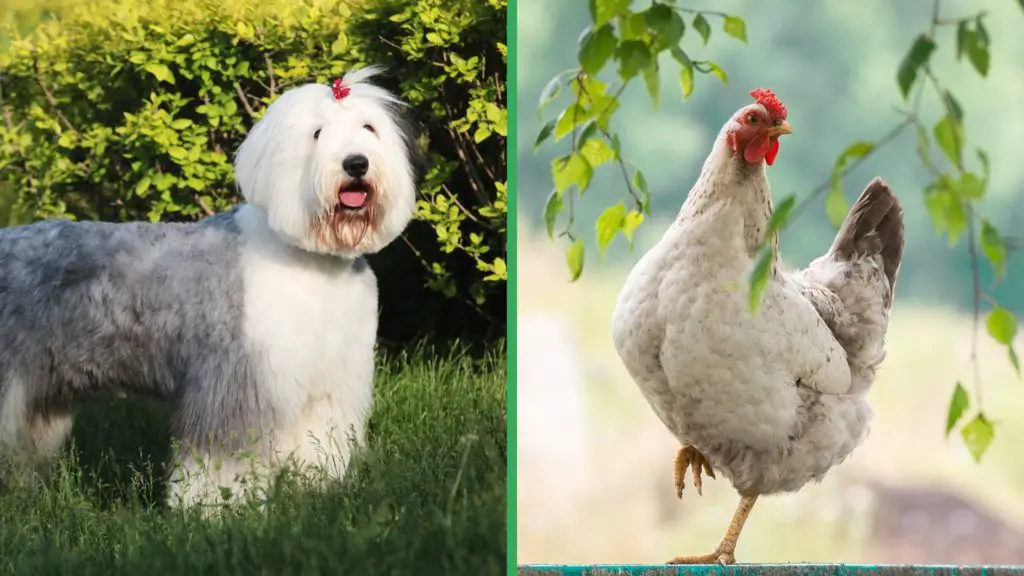
3. Akbash
An Akbash is obedient and alert, often known for guarding people and animals that they are familiar with. Their prey drive is also very low, making them one of the best dogs for chickens.
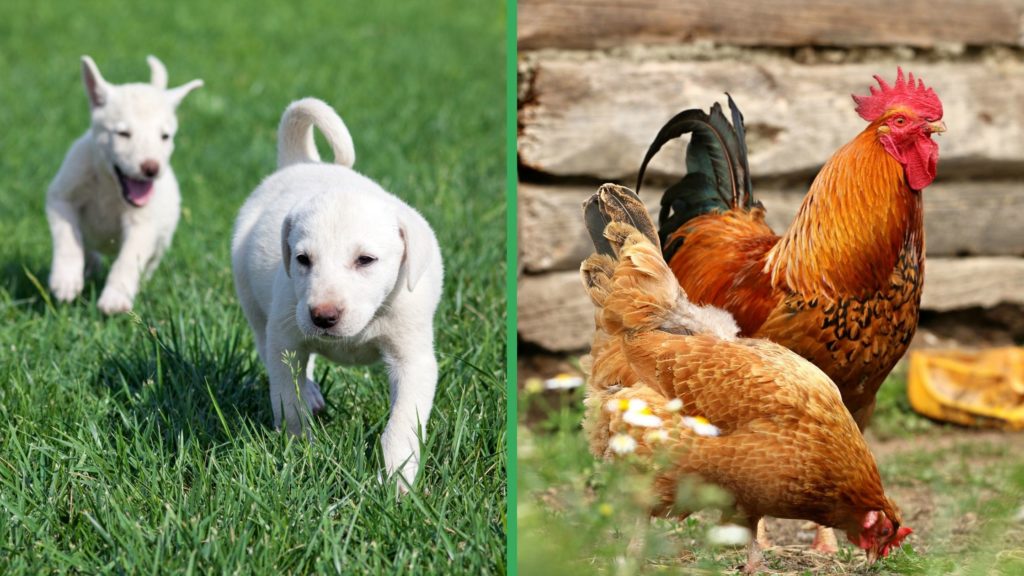
4. Maremma Sheepdog
The Maremma Sheepdog was bred to guard flocks from predators, making them the best dog to protect chickens and not attack them. They are also known for their friendly temperament and getting on with pretty much any other animal.
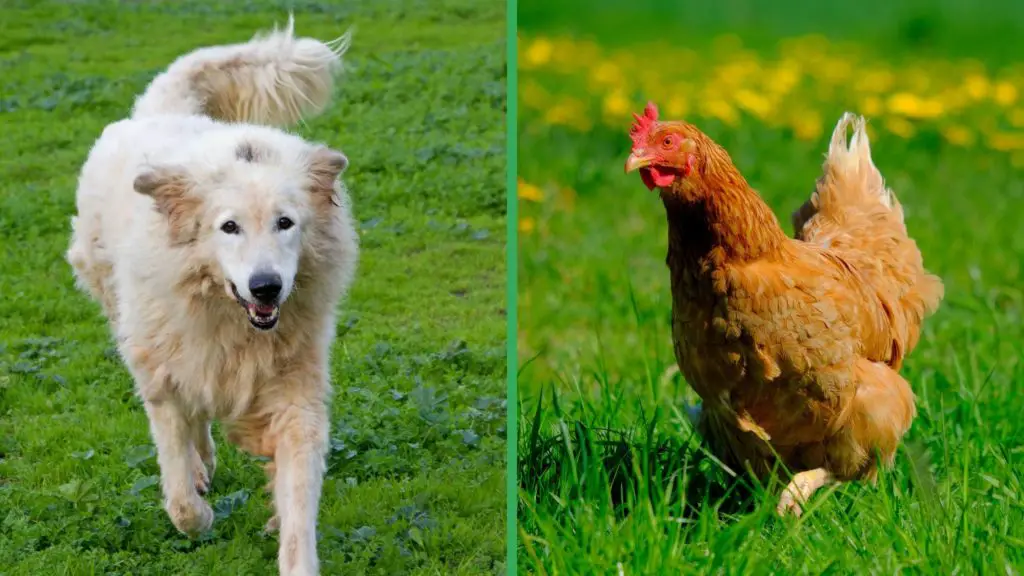
5. Pyrenean Mastiff
Pyrenean Mastiffs are extremely calm and tolerant, as well as being an excellent guard dog. Due to their size, they will keep predators who want to get to your chickens at bay.
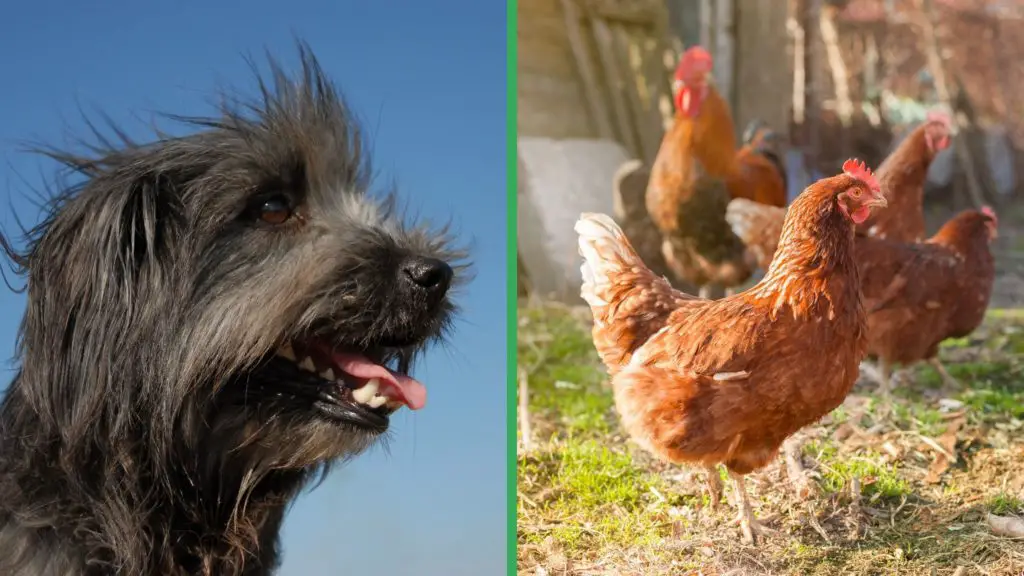
6. Maltese
A popular choice of small dog breed to keep with chickens is the Maltese. They are super friendly towards other animals and have no interest in chasing chickens or anything else.
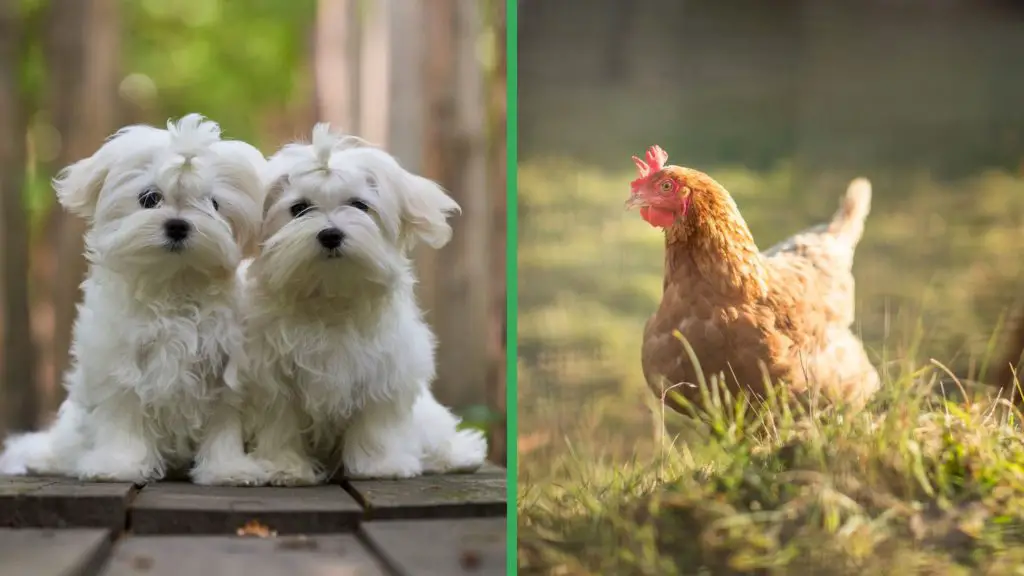
7. Japanese Chin
This breed of dog isn’t very energetic and they can be trained to leave livestock alone. Japanese Chins also have a low prey drive, making them a perfect companion for chickens.
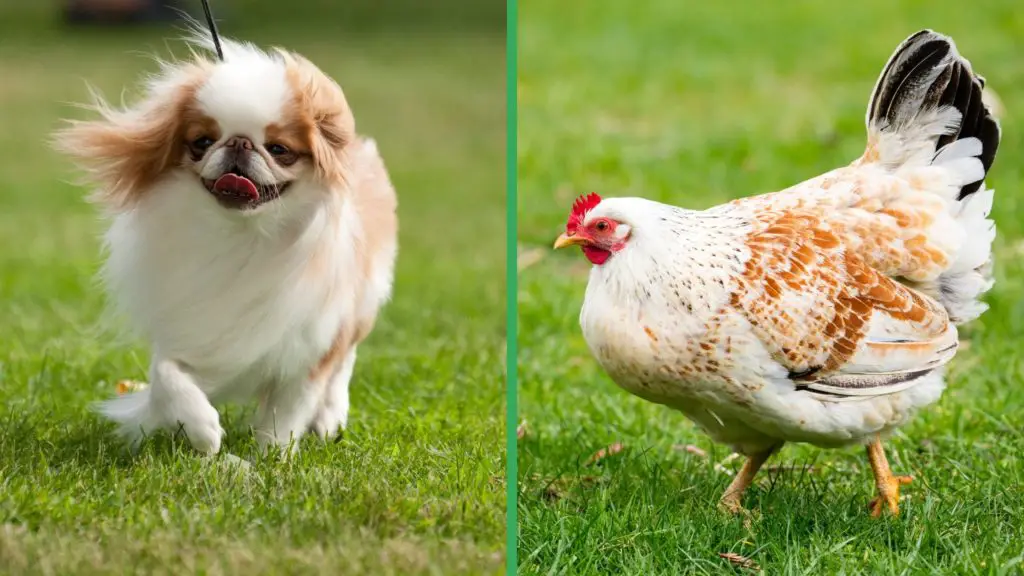
8. Komondor
As one of the largest dogs in the world, Komondors are often trained to protect sheep but they can also handle chickens and other farm animals with ease. This large breed is known for its alertness and becoming a loving member of the family.
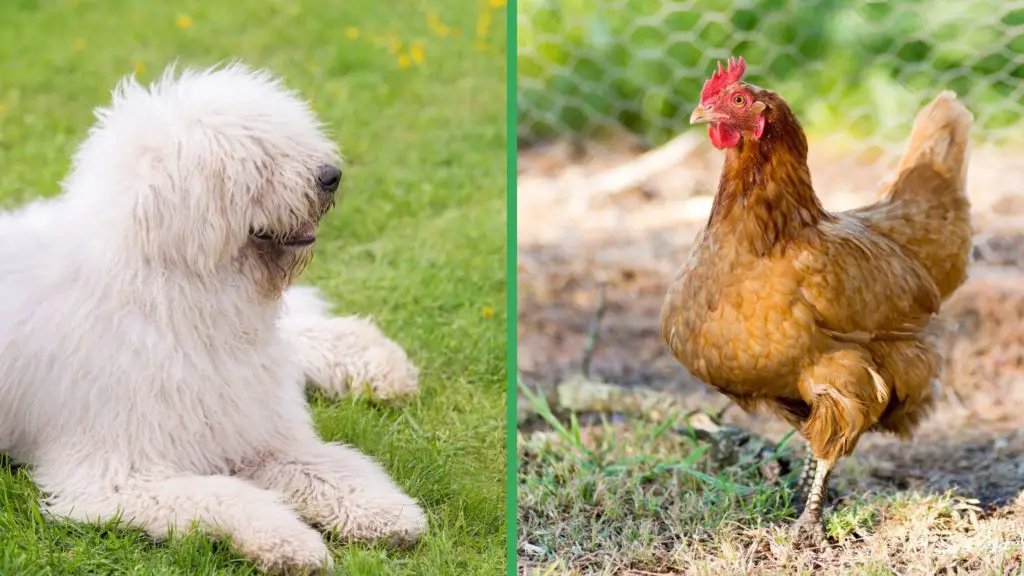
9. Great Pyrenees
This Golden Retriever look-alike are working dogs that can be easily trained to protect livestock and direct their natural prey drive to intruders. Great Pyrenees are known to be particularly gentle towards small helpless animals such as chickens.
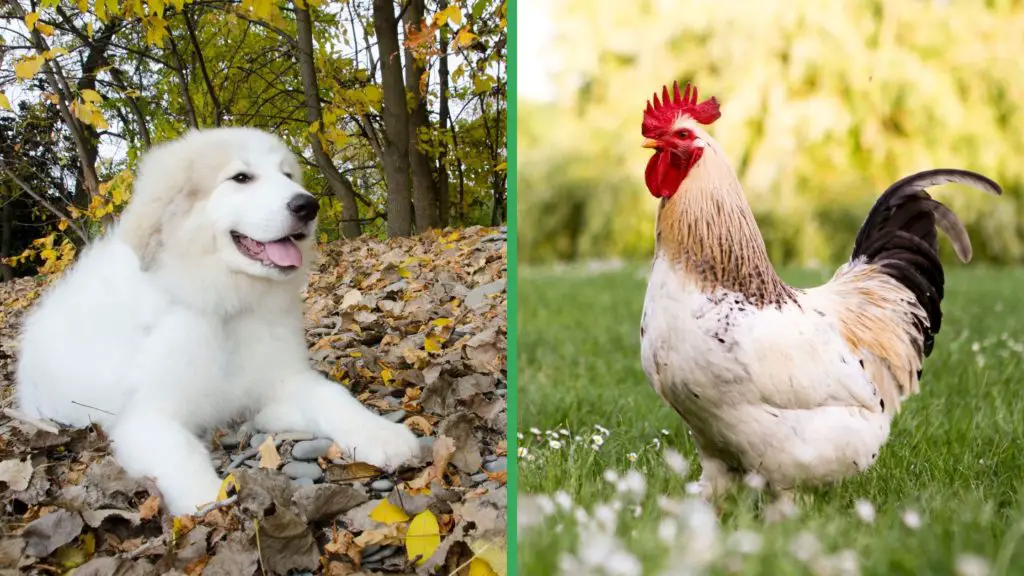
10. Kuvasz
This breed is considered a flock-guarding canine and a natural protector. Kuvasz dogs require consistency and lots of exercise but can become fiercely loyal to your commands with the right training.
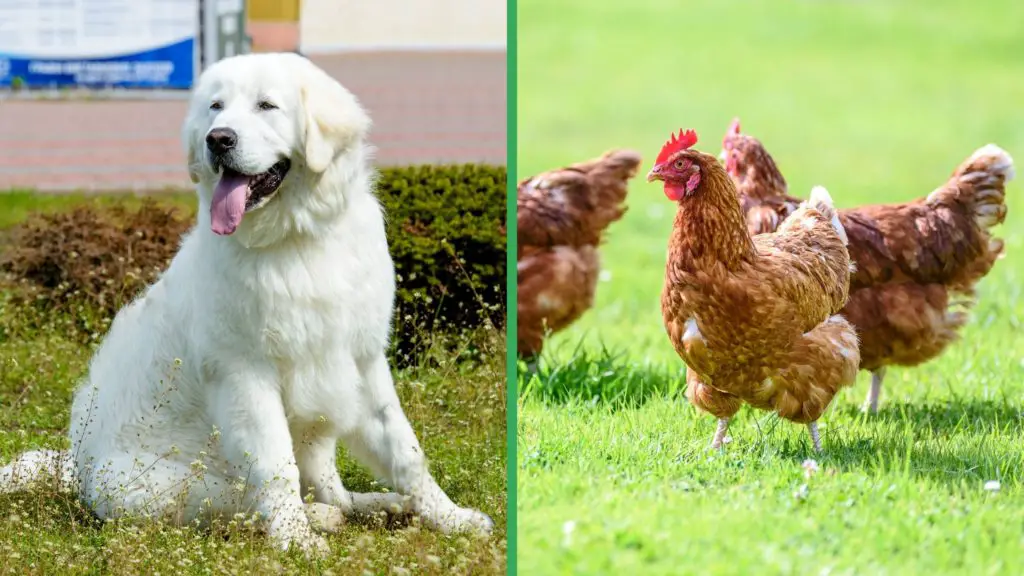
10 worst dogs for chickens
Certain dog breeds, such as the ones listed below, have a high prey drive and won’t make a good partner for your flock.
1. German Shepherd
German Shepherds have a natural instinct to chase running animals. It’s highly likely that they will grab, bite, injure or accidentally kill chickens because of their high prey drive. Sudden movement will trigger a dog’s response to chase and hunt small animals, which means it’s best to keep them away from flocks of chicken.
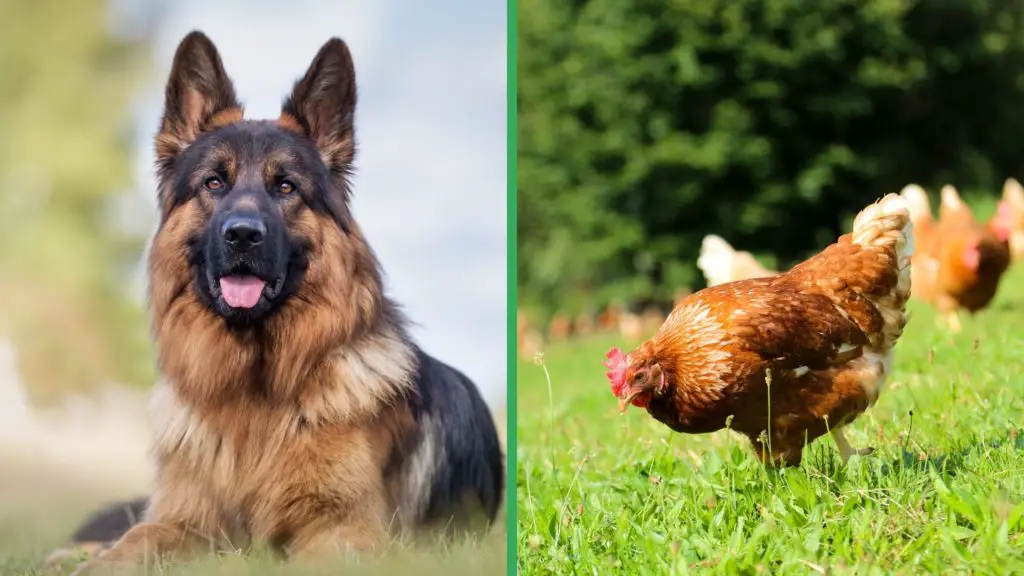
2. Jack Russell Terrier
Small dogs such as Terriers can also pose a threat to your flock of hens. Jack Russell Terriers love to chase small animals that love to move around a lot. If you want your chickens to live a harmonious lifestyle, you will need to choose another breed of dog.
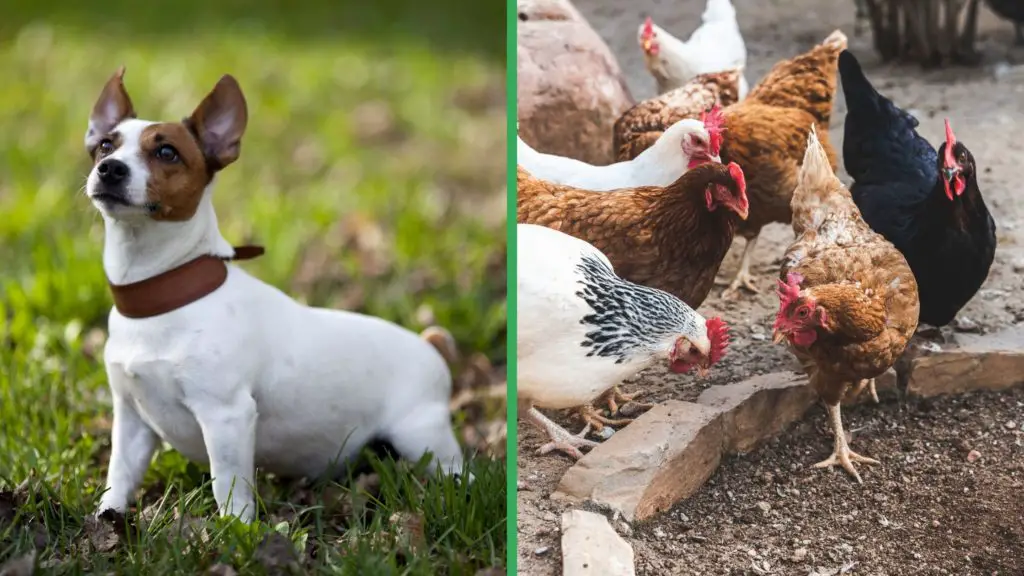
3. Yorkshire Terrier
Like Jack Russell Terriers, Yorkshire Terriers have a strong hunting instinct for small animals such as chickens. Yorkies are also known for being difficult to train, so even with the best intentions and training program you may find it hard to get these small dogs to behave well around chickens.
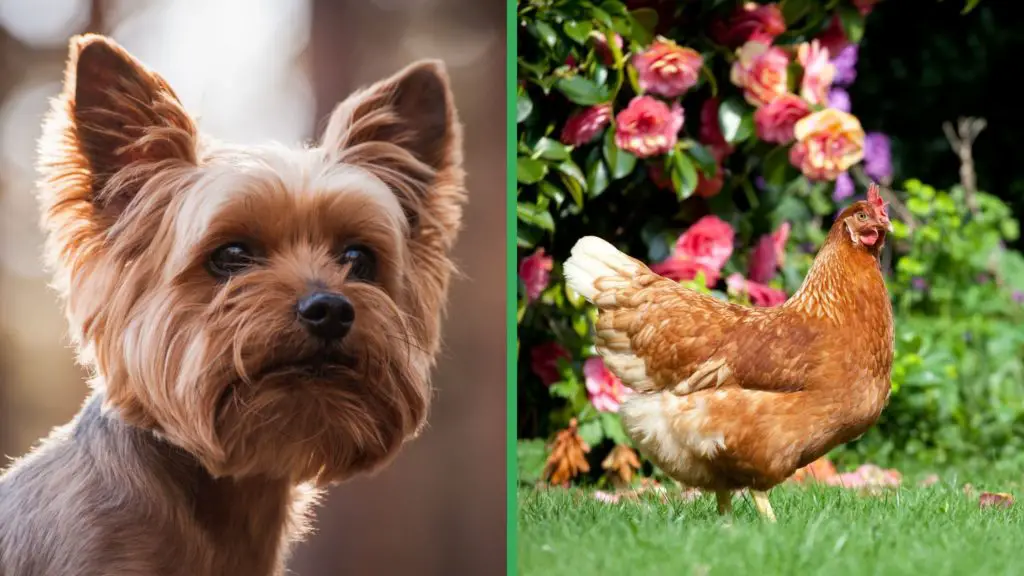
4. Greyhound
Greyhounds have a high prey drive and are born to chase rabbits, which means they will also love to chase other small animals such as chickens. Greyhounds can also reach speeds of up to 72 km/h. Your chickens won’t stand a chance.
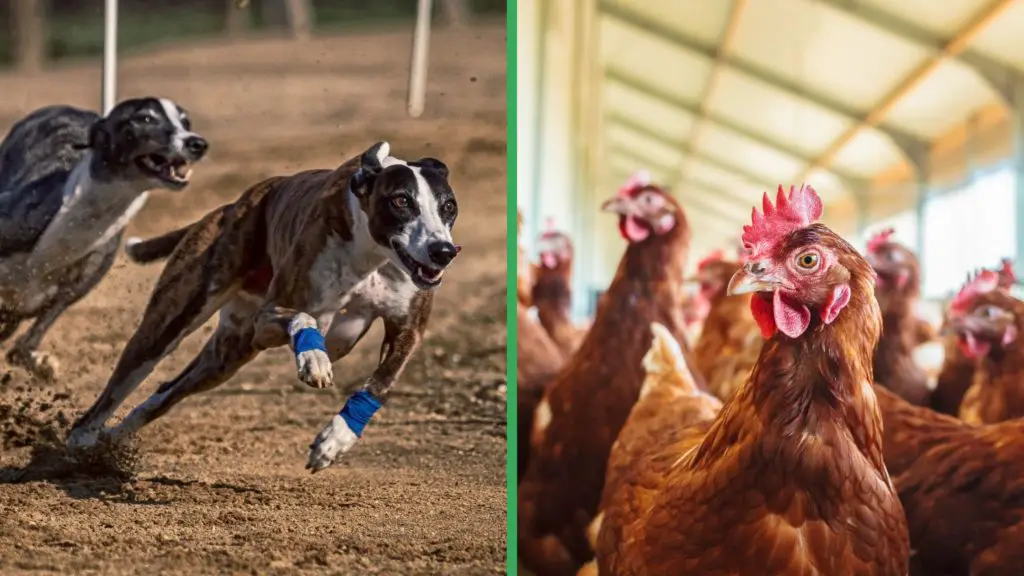
5. Rottweiler
A Rottweiler’s natural size, strength, endurance and protective instincts make them an obvious farm dog breed. However, their energetic nature means they are unable to resist the temptation to chase chickens. Rottweilers may not intend to kill livestock, but their size and strength make it extremely easy for chickens to get hurt or killed during a playful chase.
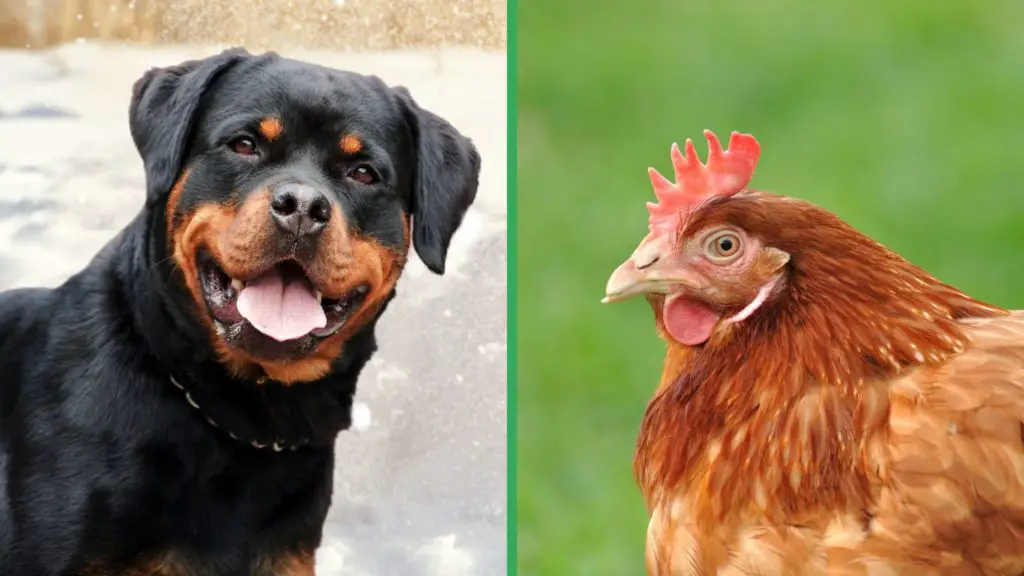
6. Pitbull
Whilst pit bulls can be gentle with humans, the same isn’t the case when it comes to livestock. Historically they have been used to seize feral livestock, but not to herd or tame sheep, cattle or chickens due to their ability to be rough. Even with extensive training, pit bulls shouldn’t’ be your first pick when it comes to farm or backyard work guarding small animals.
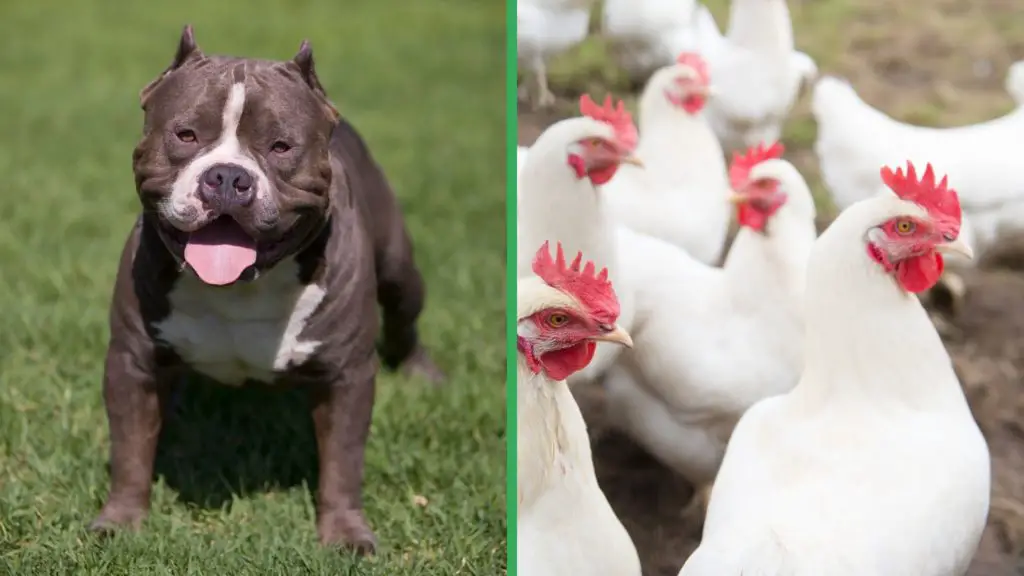
7. Border Collie
Whilst Border Collies have natural herding instincts for sheep and cattle, they are not gentle enough to be kept with chickens. A collie is a vocal breed of dog who will love to bark at, chase and play with a flock of chickens.
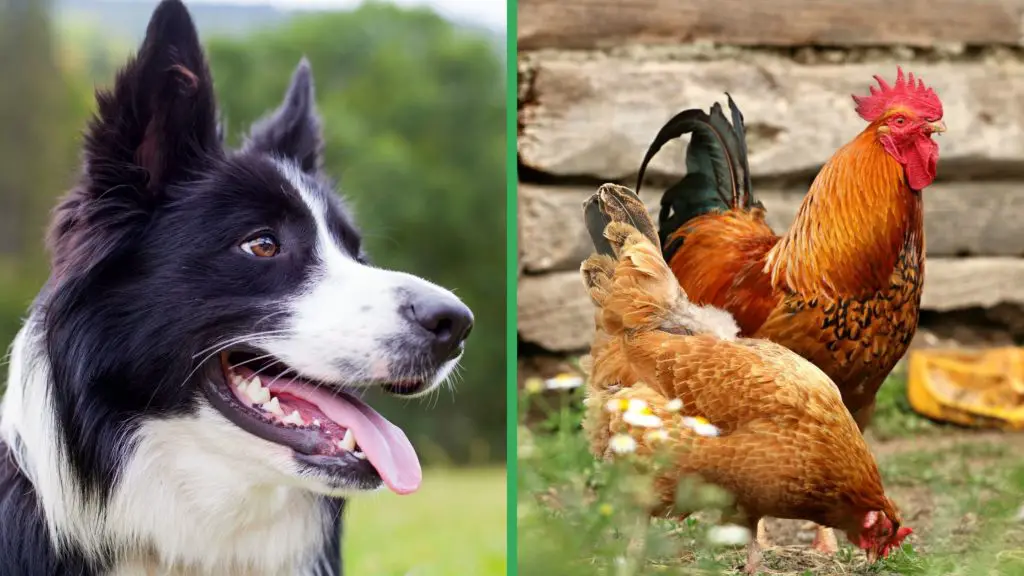
8. Siberian Husky
Siberian Huskies hunt like a wolf pack and are very intelligent animals that have been known for opening dog-proof cages and gates to hunt prey. They are also quick workers, which means your Husky could have access to your chickens in the blink of an eye.
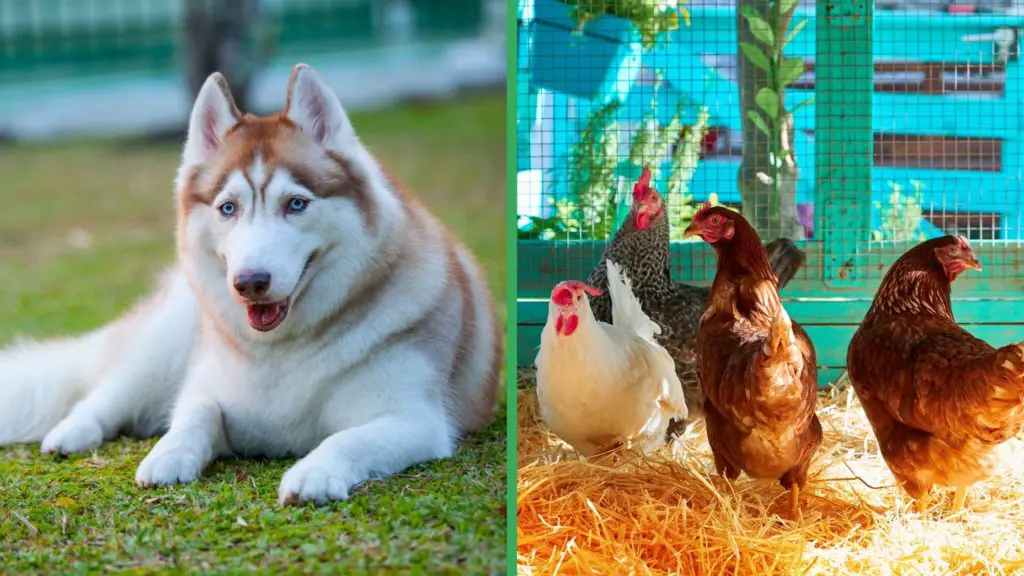
9. Weimaraner
This big, active dog was bred to be a hunter in the 19th century and most dogs of this breed still live up to that standard. They have plenty of stamina and large jaws that won’t think twice about snapping up a chicken for a snack.
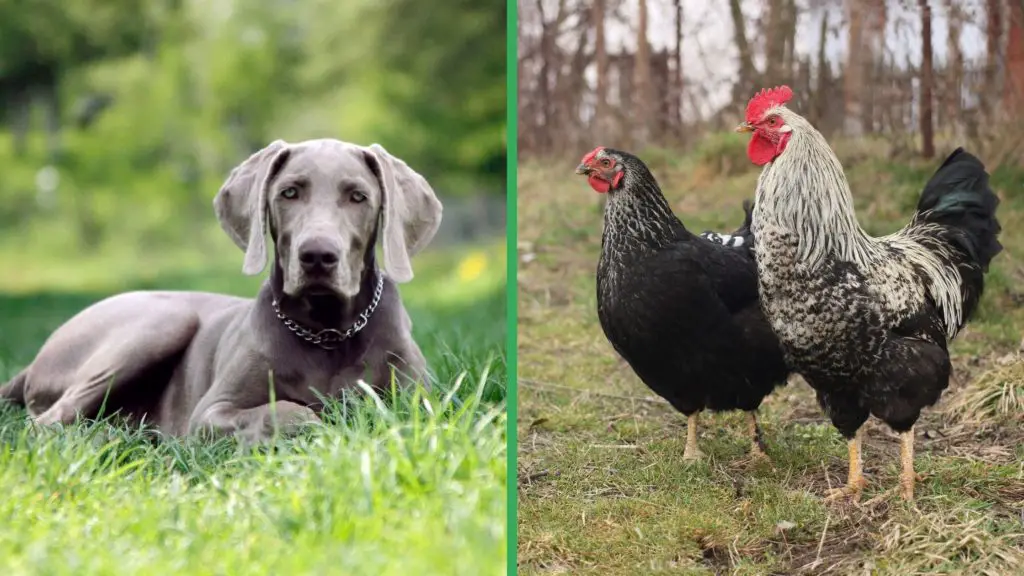
10. Whippet
Whippets are known for being gentle and non-aggressive with humans but will chase almost anything that moves and happily run after and potentially kill chickens if it gets the chance. Their high prey drive is another reason it’s not recommended to keep Whippets with smaller pets and livestock.
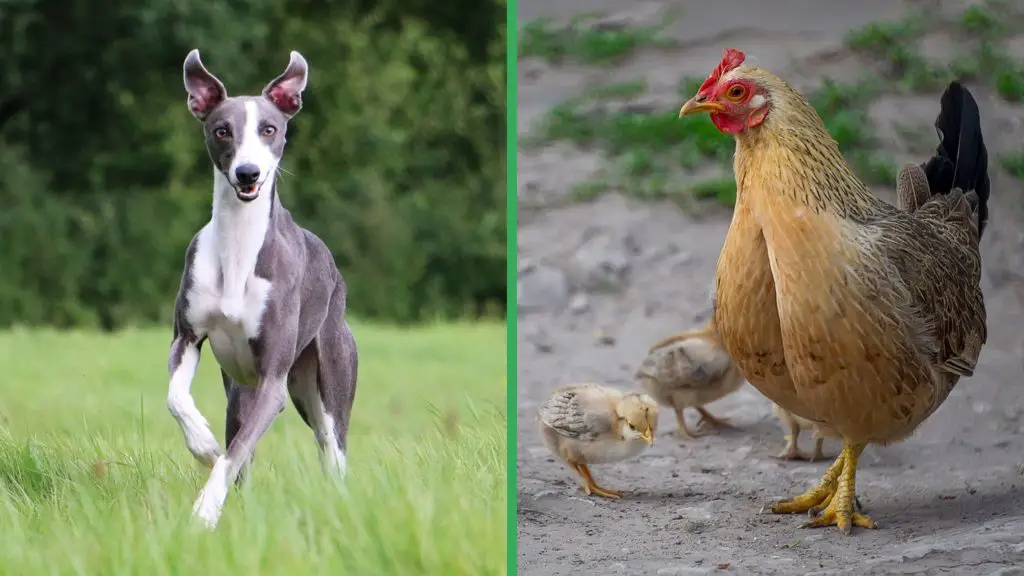
The best small, medium and large breeds
With the right training, small dogs good with chickens are:
- Japanese Chin.
- Maltese.
- Bichon Frise.
- Corgis.
- Cavalier King Charles Spaniel.
The following medium-sized dogs will get along with your flock:
- Old English Sheepdog.
- Spanish Mastiff.
- Anatolian Shepherd.
- Kangal.
- Kuvasz.
These gentle giants can be trained to guard and protect chickens rather than eat them:
- Komondor.
- The Tibetian Mastiff.
- Akbash.
- Maremma sheepdog.
- Great Pyrenees.
What kind of dog will protect chickens?
The right breed of dog will become fierce protectors of your flock and help keep foxes, owls and other predators away. So which is the best dog breed to protect chickens? Maremma Sheepdog, Komondor and Kuvasz in particular are known for their protective instincts.
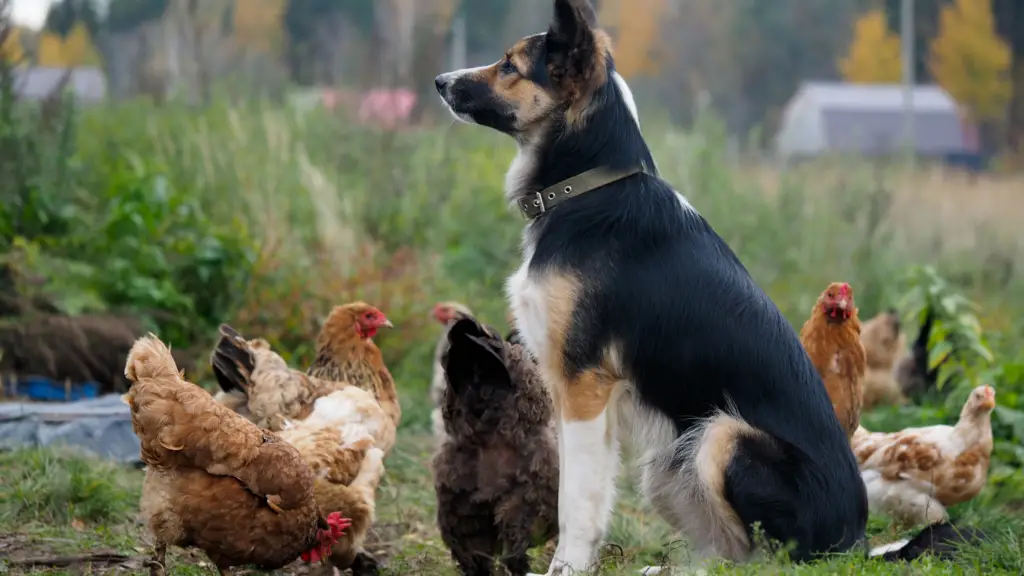
What dogs don’t kill chickens?
All dog owners know how much pooches love to chase pretty much anything and everything. Whilst dogs have the potential to kill chickens, their natural instinct won’t be to hurt your feathered friends, but to chase them. But even chasing one can lead to its death as they often break their own necks trying to escape.
Will dogs eat chicken poop?
As a dog owner, you may be horrified to learn that your canine friend may love to lick, eat or roll in chicken poop. However, it could be harmful to your dog as chicken excrement can contain worms and salmonella which can make your pooch sick. The risk is low and will depend on whether the chickens are sick or carrying parasites or diseases, but it’s important to try and discourage your dog from eating chicken poop where possible.
The most effective way to stop diseases from being passed between chickens and dogs is to keep their enclosures separate, clean and tidy. Adding pineapple to your chickens’ diet makes their excrement taste bad for dogs, which could stop your pooch from eating it again.
How to introduce a dog to chickens
If you decide to take the plunge and get some chickens, the next step is to carefully plan how you’re going to introduce them to your furry friend. Rushing the introduction process is likely to be a recipe for disaster when it comes to introducing dogs and chickens.
Follow these steps to make the process as seamless as possible:
1. Pick a breed of chicken: as with any animal, different breeds have different personalities so some chickens will act differently around dogs to others. Ideally, chickens that are kept with dogs should be docile and not nervous. Consider Sussexes, Buckeyes or Australorps.
2. Set some boundaries: for the first few days, your chickens should be kept in their coop so that they can become comfortable in their environment. The same principle applies to dogs, they will remain calmer if they are in a familiar setting with their lease on and owner by their side. Your dog needs to learn that he is not allowed in the chicken house, so keeping it securely closed will help your dog understand the boundaries.
3. Make the initial introductions: a top tip for this stage is making sure your dog is tired out from lots of exercise and fed beforehand. This is because you don’t want your dog to be too energetic or hungry for the first meeting.
Place your chickens in their chicken coop and check that they are safe and happy. Put your pooch on a short leash and slowly walk your dog around the coop. Dogs make sense of the world by using smell, so let your pooch sniff the area from a safe distance of around 30 meters. Keep the first session short and watch your dog’s body language. If they are demonstrating signs of good behavior, you may want to take them a bit closer to the coop. However, if you witness any aggressive behavior such as growling or barking, take them away from the chickens immediately and try again another day. If your dog doesn’t take much or an interest in the chickens, give him a treat to encourage this behavior.
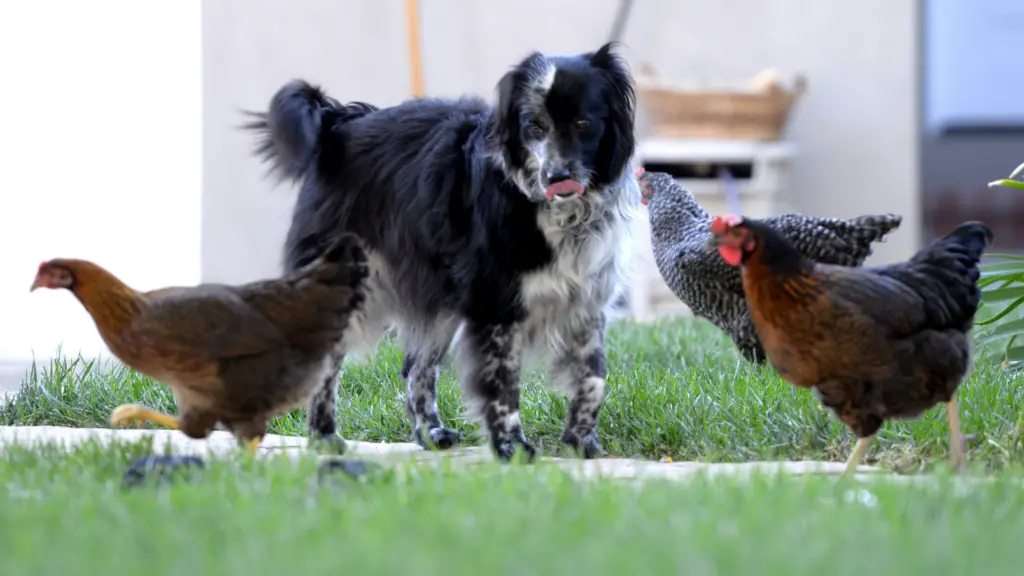
4. Lose the leash: when your dog shows no signs of aggression such as barking or pulling during your walk around the coop, try removing the leash. It can take some dogs many weeks or months to get to this stage so don’t rush it. Stay close to your dog so that you can intervene if your dog decides to show any negative behavior towards the chickens. Once you’ve walked around the chickens with your dog a few times calmly, you can begin to reduce the treats.
5. Take it slow: regardless of which breed of dog you decide to introduce to your flock of chickens, it’s important that you take the introductions and training slowly. It will take time, patience and hard work but the end result of seeing your pooch accept your livestock as part of the family rather than dinner will be worth it.
It’s important to note that introducing chicks to dogs is very different from introducing chickens. Chicks are very delicate and need to be kept inside in a warm environment for the first few weeks of their lives. Introduce chicks to dogs by holding the chick in your hand and getting down to your dog’s level. Carefully let the dog sniff the chick and sense the connection between your hand and the chick.
How do you stop a puppy from chasing chickens?
It is possible to introduce dogs to chickens at any age, however introducing a puppy rather than an older dog will take less work and training. They can also grow up with the chickens and understand that they are part of the family.
Dogs are naturally programmed to chase moving objects but it’s much easier to train your dog when they are a puppy because they are impressionable. All puppies will have a natural instinct to chase chickens so it’s best not to let them near your flock. Not only could your puppy hurt or kill a chicken, but chickens will also naturally try to fight predators by pecking which could seriously injure your puppy if a heck pecks them on their small, delicate head.
The best way to stop a puppy from chasing chickens is to keep them separate. Don’t allow your puppy to venture into the chicken coop so he knows that he’s not allowed in there.
Before you train your pup not to chase, teach them basic commands such as ‘sit’ and ‘stay’. The distract and reward technique works by praising your puppy for not chasing and giving them a food reward as a distraction from the temptation to chase. This works particularly well for young dogs who will quickly learn the home rules.
Puppies may feel overwhelmed with a large flock of hens, so start by showing your puppy a few chickens and shut the rest safely away in their hutch. You can rotate the chickens so that they can get used to the puppy too. Keep your pup on a leash so he feels safe and your flock won’t feel threatened.
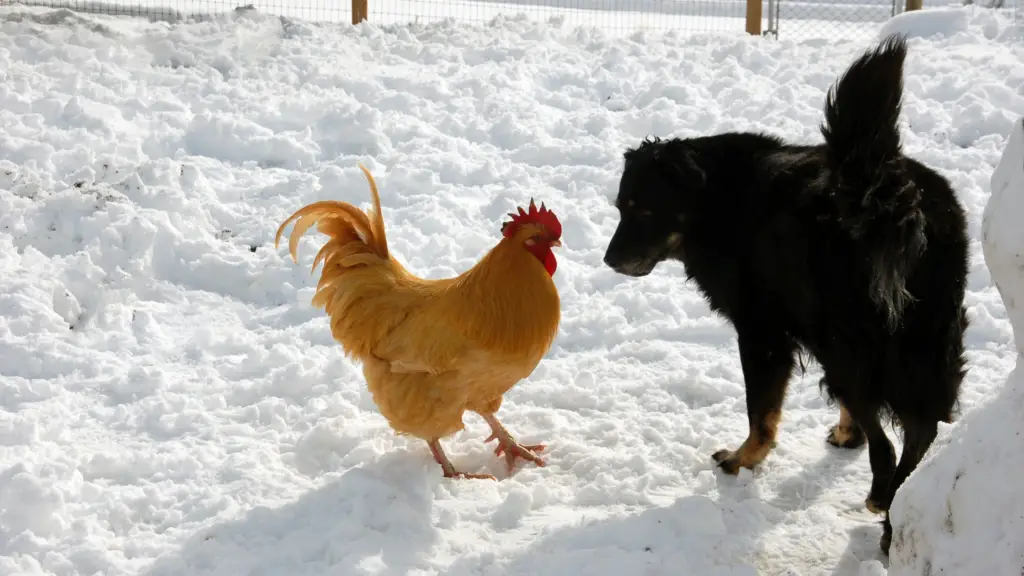
Can chickens bond with dogs?
It is possible for chickens and dogs to get along nicely and mingle together in your backyard, depending on both the dog and the chickens.
Small dogs may see large chickens as a threat in the same way that chickens may see a large, energetic dog as an enemy. For chickens to successfully bond with dogs, the breed of canine needs to be the right fit.
Give our bonding top tips a go and you may just find that your dogs and chickens become backyard best buddies.
- Don’t let your concerns stop you from getting chickens. Instead, do your research on dog and chicken breeds and use the advice from this article to make an informed choice.
- Understand that introducing chickens to your dog’s home is a new change for them, so let them sniff and investigate so they can become acquainted with the new family members.
- Let your dog know what he is doing right and wrong around chickens so he can learn how to behave correctly.
Dogs and chickens
All dogs are different and will behave in various ways around small animals. Breed traits will help you determine which dogs are less likely to see your flock of chickens as a tasty snack.
Always make an informed decision when selecting a dog breed to keep alongside chickens in your backyard. Opt for canines with a low prey drive with an easy-to-train nature to make the co-habiting as seamless as possible.
Don’t forget, a well-trained pooch makes raising and protecting chickens much easier.
Looking for More Great Articles About Dog Breeds?
- Pomskies – A Complete Guide to the Pomsky Dog Breed (Cost, Attributes, Care + More)
- Sarabi Dog – A Complete Guide to the Iranian Shepherd/Persian Mastiff Breed
- All about the Beagle Lab Mix: Beagador Breed Guide
- 10 Gorgeous Golden Retriever Mixes (With Pictures)
- 10 Worst Dog Breeds for Cats
Reference list
1. Poultry Keeper “chicken breeds” https://poultrykeeper.com/chicken-breeds/ Accessed 26th July 2021
2. Good Housekeeping “medium sized dogs” https://www.goodhousekeeping.com/life/pets/advice/g1825/medium-sized-dogs/ Accessed 26th July 2021
3. Pets at Home “how to train puppies” https://www.petsathome.com/pet-talk/puppy-advice Accessed 26th July 2021
4. Purinamills “how to care for baby chicks” https://www.purinamills.com/chicken-feed/education/detail/caring-for-baby-chicks-what-to-do-once-they-arrive Accessed 26th July 2021

